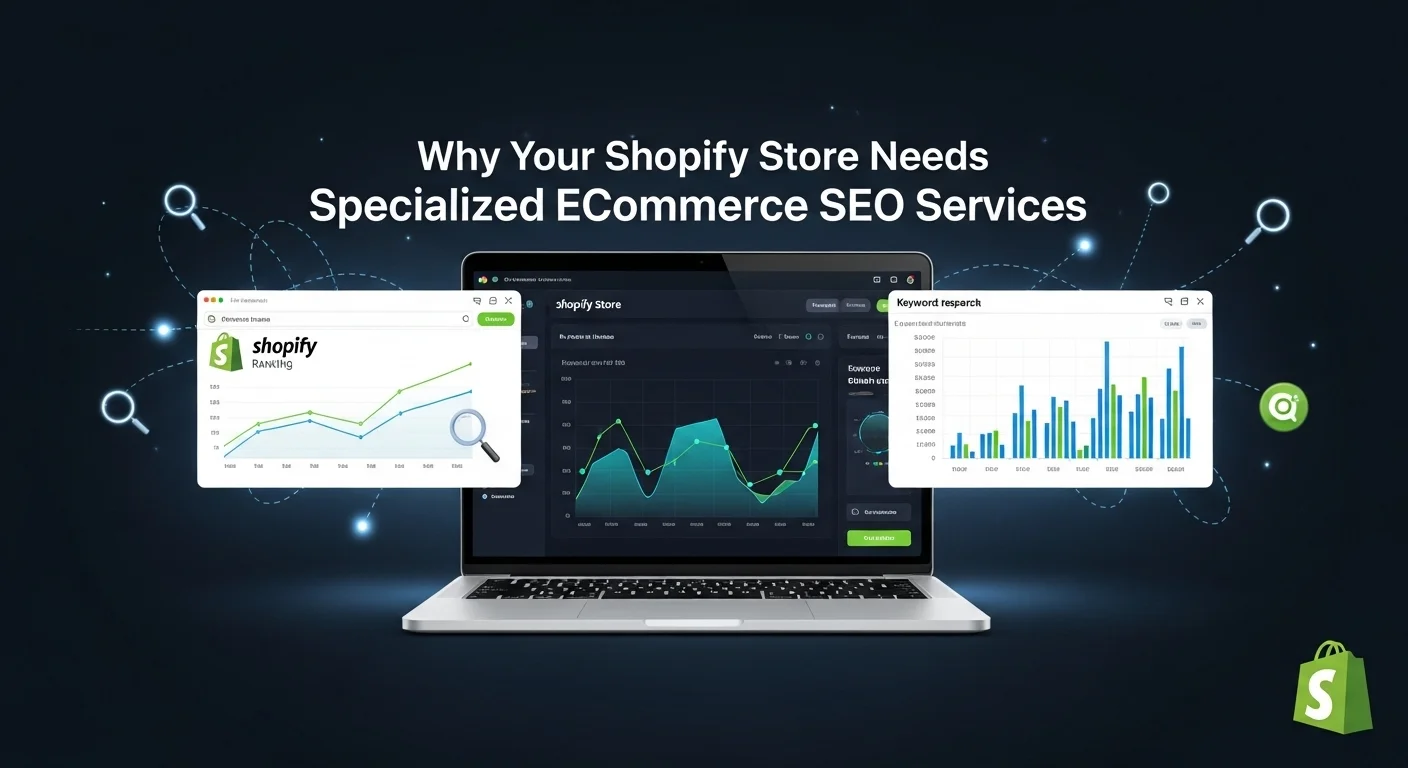In today’s competitive digital marketplace, simply launching a Shopify store isn’t enough to guarantee success. With millions of online stores competing for customer attention, your eCommerce website development must be coupled with strategic search engine optimization to achieve meaningful visibility and sales growth. This comprehensive guide explores why specialized eCommerce SEO services for Shopify store optimization are essential for your business success and how partnering with the right eCommerce development company can transform your online presence.
Understanding the Unique SEO Challenges of Shopify Stores
Shopify stores face distinct SEO challenges that require specialized eCommerce SEO services to overcome effectively. Unlike traditional websites, eCommerce platforms must optimize for product searches, category pages, and transactional keywords while managing complex site structures and dynamic content. Professional eCommerce development services understand these nuances and implement targeted strategies that address Shopify-specific optimization requirements.
The architecture of Shopify stores presents unique technical considerations that standard SEO approaches often fail to address adequately. From URL structure optimization to schema markup implementation, eCommerce website development services must incorporate SEO best practices from the ground up to ensure maximum search engine visibility and user experience optimization.
The Critical Role of Technical SEO in eCommerce Website Development
Technical SEO forms the foundation of successful eCommerce website development, particularly for Shopify stores that require specialized attention to site speed, mobile responsiveness, and crawlability. An experienced eCommerce development agency understands that technical optimization must be integrated into the development process rather than treated as an afterthought.
Core technical elements include optimizing site loading speeds, implementing proper header structures, ensuring mobile-first design principles, and creating XML sitemaps that effectively communicate your store’s structure to search engines. These technical foundations require expertise from a professional eCommerce development company that understands both development and SEO requirements.
Why Generic SEO Services Fall Short for Shopify Stores
Generic SEO services often fail to deliver results for eCommerce platforms because they lack the specialized knowledge required for online store optimization. eCommerce SEO services for Shopify store success must understand product catalog management, inventory-based content strategies, and seasonal optimization patterns that differ significantly from traditional website SEO approaches.
Professional eCommerce website development services recognize that Shopify stores require ongoing optimization strategies that adapt to inventory changes, seasonal trends, and evolving customer search behaviors. This dynamic optimization approach requires continuous monitoring and adjustment that generic SEO providers typically cannot deliver effectively.
Essential Components of Specialized eCommerce SEO Services
Product Page Optimization Strategies
Product page optimization represents one of the most critical aspects of eCommerce SEO services for Shopify store success. Each product page must be optimized for specific keywords while maintaining user experience and conversion optimization. This requires detailed keyword research, compelling product descriptions, optimized images, and strategic internal linking structures.
Professional eCommerce development services implement comprehensive product optimization strategies that include schema markup for rich snippets, optimized meta descriptions, and strategic keyword placement that enhances both search visibility and user engagement. These optimization techniques require deep understanding of eCommerce customer journeys and search behavior patterns.
Category and Collection Page SEO
Category pages in Shopify stores require specialized optimization approaches that balance keyword targeting with user navigation needs. eCommerce website development company experts understand how to structure category pages for both search engine crawling and user experience optimization, implementing breadcrumb navigation, optimized category descriptions, and strategic product filtering options.
Effective category page optimization involves creating compelling category descriptions that incorporate target keywords naturally while providing genuine value to visitors. This content strategy requires ongoing refinement based on search performance data and user behavior analytics.
Content Marketing Integration
Successful eCommerce SEO services for Shopify store growth integrate content marketing strategies that support product discovery and brand authority building. This includes blog content creation, buying guides, product comparison articles, and industry insights that attract organic traffic and support the customer journey from awareness to purchase.
An experienced eCommerce development agency understands how to integrate content marketing with eCommerce website development to create seamless user experiences that guide visitors from educational content to product pages and ultimately to conversion actions.
The Importance of Local SEO for eCommerce Stores
Even online-focused businesses benefit significantly from local SEO optimization, particularly for businesses with physical locations or those targeting specific geographic markets. eCommerce website development services must incorporate local SEO elements including Google My Business optimization, local keyword targeting, and location-based content strategies.
Local SEO for eCommerce stores involves optimizing for “near me” searches, local product availability queries, and geographic-specific shopping behaviors. This specialized approach requires understanding of local search algorithms and consumer behavior patterns that vary by region and market segment.
Mobile Optimization and eCommerce SEO Success
Mobile optimization has become crucial for eCommerce SEO success, with mobile commerce representing an increasingly large portion of online sales. Professional eCommerce development company services prioritize mobile-first design principles that ensure optimal performance across all device types while maintaining SEO effectiveness.
Mobile SEO for Shopify stores involves optimizing page loading speeds, implementing responsive design principles, optimizing touch-friendly navigation, and ensuring that all SEO elements function effectively on mobile devices. This comprehensive mobile optimization requires technical expertise and ongoing performance monitoring.
Conversion Rate Optimization and SEO Integration
The most effective eCommerce SEO services for Shopify store success integrate search engine optimization with conversion rate optimization to maximize both traffic and sales performance. This holistic approach ensures that increased organic traffic translates into meaningful business results rather than simply vanity metrics.
Conversion-focused SEO involves optimizing for commercial intent keywords, implementing trust signals, optimizing checkout processes for SEO value, and creating persuasive product descriptions that serve both search engines and potential customers effectively.
Why Choose Professional eCommerce Development Services
Comprehensive Technical Expertise
Professional eCommerce website development company services provide comprehensive technical expertise that encompasses both development and SEO optimization. This integrated approach ensures that your Shopify store is built with SEO best practices from the foundation up, avoiding common technical issues that can limit search performance.
Technical expertise includes understanding Shopify’s platform limitations and opportunities, implementing advanced SEO features, optimizing site architecture for crawlability, and ensuring that all customizations maintain SEO effectiveness. This level of technical knowledge requires specialized experience with eCommerce platforms.
Ongoing Optimization and Maintenance
Successful eCommerce SEO requires ongoing optimization and maintenance that adapts to algorithm changes, market trends, and business growth. Professional eCommerce development services provide continuous monitoring, performance analysis, and strategic adjustments that maintain and improve search visibility over time.
This ongoing support includes regular technical audits, content optimization updates, keyword strategy refinements, and performance reporting that demonstrates ROI and guides future optimization efforts. Continuous optimization ensures that your investment in eCommerce SEO services delivers long-term results.
Integration with Business Goals
The best eCommerce development agency services align SEO strategies with broader business objectives, ensuring that optimization efforts support revenue growth, market expansion, and customer acquisition goals. This strategic alignment maximizes the impact of SEO investments and creates sustainable competitive advantages.
Strategic SEO integration involves understanding your target market, competitive landscape, seasonal business patterns, and growth objectives to create customized optimization strategies that support overall business success rather than simply improving search rankings.
Measuring Success: Key Performance Indicators for eCommerce SEO
Organic Traffic and Revenue Metrics
Effective eCommerce SEO services for Shopify store optimization focus on metrics that directly impact business success, including organic traffic growth, revenue from organic channels, and conversion rates from search traffic. These performance indicators demonstrate the real business impact of SEO investments.
Revenue-focused metrics include tracking organic traffic value, customer lifetime value from organic channels, and return on investment from SEO activities. Professional eCommerce website development services provide comprehensive reporting that connects SEO performance to business outcomes.
Search Visibility and Ranking Performance
Search visibility metrics include keyword ranking improvements, featured snippet acquisitions, and overall search engine results page presence. These metrics indicate the effectiveness of optimization efforts and predict future organic traffic growth potential.
Advanced SEO reporting includes competitor analysis, market share tracking, and search visibility trends that inform strategic decision-making and optimization priorities. This comprehensive analysis guides ongoing optimization efforts and identifies new opportunities for growth.
DeftSoft: Your Partner for eCommerce Website Development and SEO Success
DeftSoft stands out as a leading eCommerce development company that specializes in creating high-performance Shopify stores integrated with comprehensive SEO strategies. Our eCommerce website development services combine technical excellence with strategic SEO implementation to deliver measurable business results. Our team of experienced developers and SEO specialists understands the unique requirements of eCommerce platforms and implements specialized eCommerce SEO services for Shopify store success. We provide end-to-end solutions that encompass everything from initial eCommerce website development to ongoing optimization and performance enhancement.
DeftSoft’s approach to eCommerce development services prioritizes both immediate functionality and long-term SEO success. We build Shopify stores that not only look professional and function smoothly but also rank well in search engines and convert visitors into customers effectively. Our comprehensive eCommerce website development company services include custom theme development, performance optimization, SEO integration, mobile responsiveness, and ongoing maintenance and support. We ensure that every aspect of your Shopify store contributes to your overall business success.
As an experienced eCommerce development agency, DeftSoft understands that successful online stores require more than just attractive designs and functional features. Our specialized eCommerce SEO services for Shopify store optimization ensure that your investment in eCommerce website development delivers maximum return through increased visibility, traffic, and sales.
The Future of eCommerce SEO and Shopify Store Success
The eCommerce SEO landscape continues to evolve with new technologies, changing consumer behaviors, and algorithm updates that require adaptive optimization strategies. Professional eCommerce development services stay ahead of these trends to ensure that your Shopify store remains competitive and visible in search results.
Future-focused SEO strategies include voice search optimization, artificial intelligence integration, personalization technologies, and emerging search features that will shape the next generation of eCommerce success. Partnering with an experienced ecommerce development company ensures that your store is prepared for these evolving opportunities.
Investing in specialized eCommerce SEO services for Shopify store optimization represents a strategic decision that impacts your business’s long-term success and growth potential. The right combination of professional eCommerce website development and ongoing SEO optimization creates sustainable competitive advantages that drive consistent revenue growth and market expansion.
Frequently Asked Questions
1. Why does my Shopify store need specialized eCommerce SEO services instead of regular SEO?
Shopify stores require specialized eCommerce SEO services because they have unique technical requirements, product-focused content needs, and conversion optimization challenges that regular SEO doesn’t address. DeftSoft’s eCommerce development services integrate SEO specifically for eCommerce platforms, ensuring better search rankings and sales performance.
2. How do DeftSoft’s eCommerce website development services differ from other agencies?
DeftSoft combines eCommerce website development with integrated SEO strategies from day one. Unlike other e-commerce development company providers who treat SEO as an add-on, our e-commerce website development services build SEO optimization into every aspect of your store’s architecture and functionality.
3. What eCommerce development services does DeftSoft provide for Shopify stores?
DeftSoft offers comprehensive eCommerce website development services, including custom theme development, mobile optimization, SEO integration, performance enhancement, payment gateway setup, inventory management, and ongoing maintenance. Our eCommerce development agency approach ensures all services work together for maximum results.
4. How long does it take to see results from eCommerce SEO services for Shopify store optimization?
While SEO is a long-term strategy, most clients see initial improvements within 3-6 months of implementing our specialized eCommerce SEO services for Shopify store optimization. DeftSoft’s integrated eCommerce website development services accelerate results by building SEO foundations correctly from the start.
5. Can DeftSoft help with both new Shopify store development and optimizing existing stores?
Yes, DeftSoft provides both new eCommerce website development and optimization services for existing Shopify stores. Our eCommerce development services include store audits, performance improvements, SEO enhancements, and strategic upgrades that boost both functionality and search rankings for any stage business.

